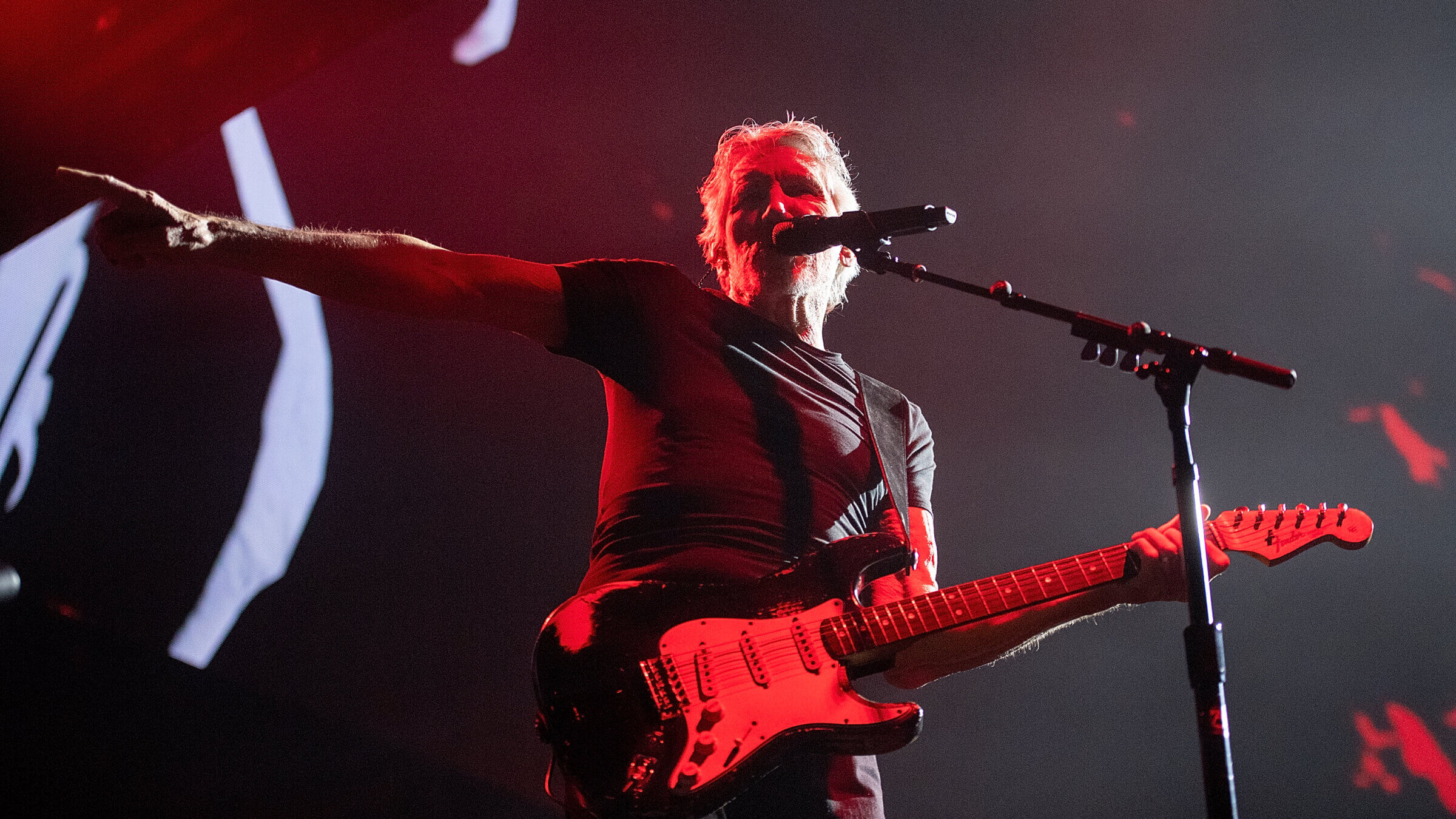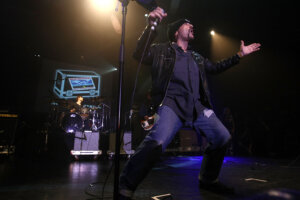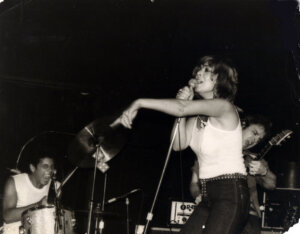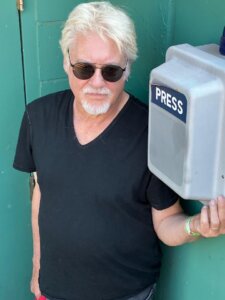Is it possible to separate Roger Waters’ music from his politics?
The 78-year-old made his name with Pink Floyd, but his vocal opposition to Israel has complicated his relationship with his Jewish fans

Roger Waters performs in Pittsburgh during his “This Is Not A Drill” tour. Photo by Getty Images
Though some young rock fans might question Rogers Waters’ relevance in the 21st century, his presence on the American musical landscape this summer has been undeniable and inescapable.
The former Pink Floyd singer-songwriter-bassist is on the road again with a tour called “This Is Not a Drill.” It was slated for 2020, but, like everything else, got derailed by the pandemic. The 31-city North American tour runs through October.
I saw the 2 1/2-hour Waters show at Boston’s sold-out TD Garden in mid-July. Before any of the 10 musicians took the stage, a statement on the big black screen hanging over the stage read: “If you’re here because you like Pink Floyd but you can’t stand Roger Waters’ politics, f— off to the bar,” only spelling out the four-letter word.
Gauntlet thrown down.
The 78-year-old Waters is known for being virulently anti-war, anti-drone, pro-Black Lives Matter, pro-indigenous people’s rights and pro-LGBTQ+. The message that blared on the screen as “Another Brick in the Wall (Part 3)” was played: PERPETUAL WAR AT ANY COST TO HELP THE RICH F— THE POOR. (It also seems worth mentioning that, while Waters is making statements that war benefits the rich at the expense of the poor, his net worth has been estimated at $310 million. And, in May, reports surfaced that Pink Floyd put its catalog up for sale and is seeking $500 million. Not that you can’t be rich and on the left.)
But some fans, even some left-leaning fans, have not been too pleased with all that Waters has said and done.
Waters, like no other rocker of his generation or stature, has made no bones about where he stands on the issue of Israel’s occupation of the West Bank. He has been adamant about advocating for Palestinian rights and has stated on numerous occasions that he’s not antisemitic but anti-Zionist.

“You can attack Israeli policy without being anti-Jewish,” Waters told The Independent back in 2010. “I’m critical of the Israeli policy of occupying Palestinian land and their policy of building settlements, which is entirely illegal under international law, and also of ghettoizing the people whose land they are building on.”
Talk of Roger Waters being antisemitic is a somewhat new phenomenon. When he referenced Jews in 1979 on Pink Floyd’s concept album “The Wall,” he sang a satirical song from the point of view of a rock star-turned-fascist-dictator.
“Are there any queers in the theater tonight?/ Get them up against the wall!” he sang-spat out in “In the Flesh.” “There’s one in the spotlight, he don’t look right to me/ Get him up against the wall!/ That one looks Jewish!/ And that one’s a coon!/ Who let all of this riff-raff into the room?”
The intent was clear: Jews, along with Blacks and gays, were minorities targeted by the extreme right. He’s been singing that song as part of this year’s set, too.
In 2011, Waters announced in an op-ed for The Guardian that he was joining the Boycott, Divestment, Sanctions movement against Israel and encouraged other musicians to follow suit. In May 2021, about 600 musicians, including Rage Against the Machine, Run the Jewels, and Serj Tankian of System of a Down signed a pledge not to perform in the country. Big Thief, whose bassist Max Oleartchik was born in Tel Aviv, planned two concerts in that city this month, but then backed out, citing what they called “the illegal occupation and the systematic oppression of the Palestinian people.”
In 2016, Waters narrated “The Occupation of the American Mind: Israel’s Public Relations War in the United States.” In 2019, he spoke at the UK Palestine Solidarity Campaign’s event for Nakba Day, which commemorates the founding of the state of Israel as a “catastrophe” because of the thousands of Palestinians displaced by it.
Waters wrote a song for the Nakba event that included the line, “We’ll walk hand in hand and we’ll take back the land, from the Jordan River to the sea,” which would mean the end of Israel as a Jewish state.
Last year, he reiterated his contention that modern Israel is “an apartheid state.”
“Waters endeavors to speak as a citizen of the world and I highly respect him for that. In my opinion, more high-profile entertainers should be so bold,” Johnny Hickman, the guitarist for Cracker, told me.
As this year’s show unfolded — and it was a sensorial barrage — I wondered how Waters’ opposition to the ongoing Israeli occupation might figure into the mix.
It did not factor directly in the music itself, most of which was drawn from Pink Floyd circa 1972-79, but it showed up on the omnipresent video screen. It was a relative sliver of the long, intense visual and audio barrage, but it was there.
On the screen was a photo of Shireen Abu Akleh, the Palestinian American journalist for Al Jazeera who was killed while covering protests to an Israeli military raid in the West Bank in May. Alongside the photo was a question that asked if Palestinian rights were not human rights? In case anyone missed the message a big, bold “F— OCCUPATION,” spelling out the four-letter word, appeared in white letters on that giant black screen.
I asked several Jewish American rockers for their take on what Waters was conveying. Two New York-based guitarists with impressive resumes declined to be quoted because of what they called the complications and nuances required to address the issue. One said the Palestinian-Israeli situation was too “fraught with controversy” to go on the record about it.

Then there’s “Handsome Dick” Manitoba, the former lead singer of the Dictators, a hard rock proto-punk band from New York.
“I don’t want to blurt out anger and hostility,” he said, “but to me he’s the ultimate pig.”
“The closest I get to the right-wing side of the political spectrum is Israel and I think regardless of what people say — ‘I like Jewish people but I don’t like Zionism’ — I laugh at that,” Manitoba went on. “Antisemitism comes in a lot of different shades; sometimes it’s obvious and sometimes it hides behind slogans. To me it feels like the Jews finally got theirs and now they’re the enemy more than ever.”
Genya Ravan is the only living rocker to have fled the Holocaust, having escaped a Russian displacement camp in 1947. She told me she’d been a Pink Floyd fan in her youth.
“I loved him,” Ravan said of Waters, “but he’s made it hard for me to love him. I still love the music, but he is drunk on his own perfume and it stinks. My message to all humans: Hate begets hate, any way you look at it. Plenty out there, don’t need no more.”
“Everyone is entitled to their opinions,” she said, “but when you’re a star, you have responsibilities. One is, don’t try and sway the world with your hate belief.”

Ira Robbins, former Newsday rock critic and publisher of Trouser Press Books, has written favorably about both Floyd and Waters but thinks the singer’s activism onstage and off has lately gone too far.
“Waters presents a problem by establishing a fan base that has nothing to do with politics,” Robbins noted. “In recent years, he’s been a vocal proponent of a controversial point of view. I think he’s daring his audience to keep up with him. But you can’t tell your audience who you have to be in order to like you.
“Those who pay to see him are white-collar people who have money,” he continued, “and probably don’t have animosity or antagonism toward Israel.”
Clearly, Waters has never lacked for ego. Most rock stars don’t. But most don’t push the political side of their ego anywhere close to what Waters does.
While he was in Canada, he spoke to The Globe and Mail about his plans to participate in a pro-Palestinian webinar. “Attempts are being made to shut down the pro-Palestine voice at the university,” he said. “I’m used to this. It happens everywhere. But I’m happy to say the voice is growing as the minutes go by. It’s not antisemitic; let’s get that out of the way. It’s the voice of the people saying, ‘We hear a lot of rhetoric about human rights but we don’t see evidence that our leaders [care about] human rights.’”
I attended Waters’ Boston concert with Peter Prescott, a former drummer from Mission of Burma and current multi-instrumentalist with Minibeast. After the show, we talked about its politics.
“The polarization is there in our country, and Waters is clearly aware of that,” Prescott said. “He looked it in the face and said, ‘This is where I’m taking it,’ and he had enough ego and confidence in people going to see him anyway.”
“Waters has an opinion and he throws it at people,” Prescott said. And, as for the occupation, he added, “What kind of opinion can I have about something going on that doesn’t have any logical resolution as it’s nearly unsolvable?”
So, can you fully enjoy Waters’ work if you do not agree with his positions? For me, the answer was yes. In the concert, there was a high percentage of content — musical, visual and political — where we were all on the same page. As were, I’m guessing, the nearly 20,000 in attendance.





















